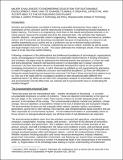Major Challenges To Engineering Education for Sustainable Development: What Has to Change to Make it Creative, Effective, and Acceptable to the Established Disciplines
Author(s)
Ashford, Nicholas A.
DownloadAshford_Challenges_Berlin.pdf (116.2Kb)
Metadata
Show full item recordAbstract
Scholars and professionals committed to fostering sustainable development have urged a re-examination of the curriculum and the restructuring of research in engineering-focused institutions of higher learning. The focus is on engineering, more than on the natural and physical sciences or on social science, because the activities that drive the industrial state – the activities that implement scientific advance – are generally rooted in engineering. Moreover, engineers are known as ‘problem solvers’ and if economies are becoming unsustainable because of engineering, it is natural to ask whether engineering as an activity and as a profession can be re-directed toward achieving sustainable transformations. Of course, engineering can not do it alone; scientific as well as social and legal changes must occur as well. This paper addresses the challenges ahead, if this optimistic vision is to be more than wishful thinking.
Following a treatment of the philosophical and intellectual foundations of technological, organizational, social, and pedagogical innovation necessary for sustainable transformations of existing institutions and mindsets, this paper ends by addressing the following themes and questions: (1) How can multi- and trans-disciplinary research and teaching coexist in a meaningful way in today’s university structures? (2) Does education relevant to sustainable development require its own protected incubating environment to survive, or will it otherwise be gobbled up and marginalized by attempting to instill it throughout the traditional curriculum and traditional disciplines? (3) How can difficulties in linking the needed teaching and research be overcome? (4) Even if there exist technical options to do so, how can it be made safe for courageous students to take educational paths different from traditional tracks? (5) What can we learn from comparative analysis of universities in different nations and environments? and (6) What roles can national and EU governments have in accelerating the needed changes?
Date issued
2004Citation
Presented at teh Conference on Engineering Education in Sustainable Development
Keywords
sustainable, development, engineering, education